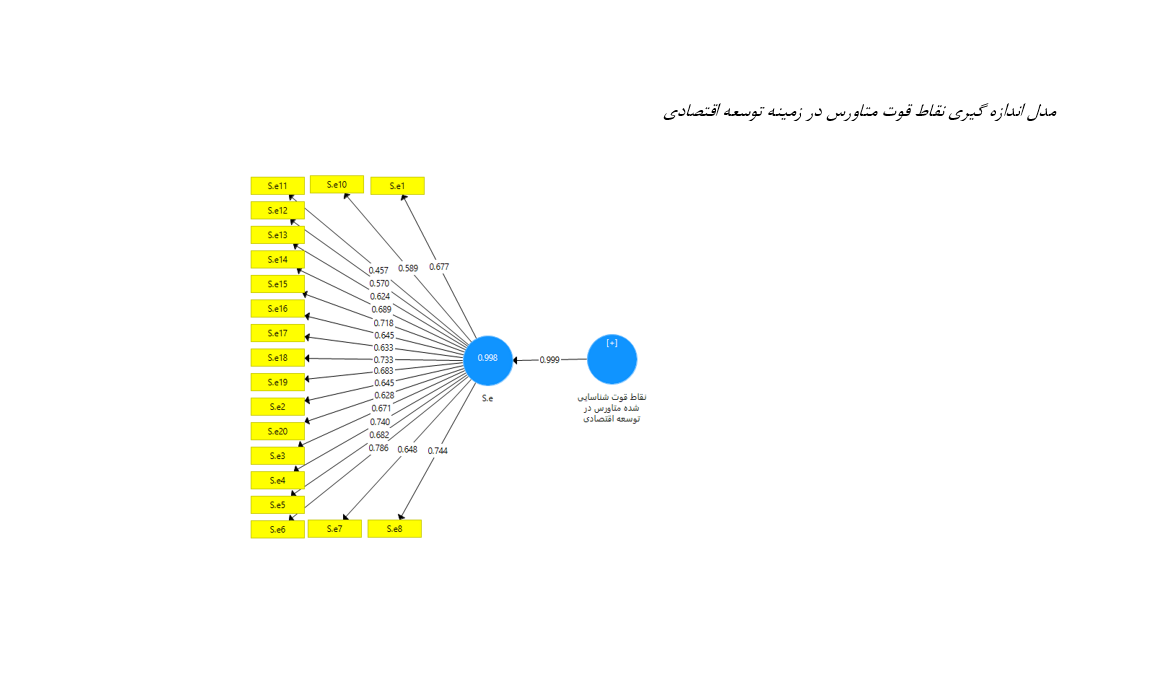Validation of the Model of Strengths, Weaknesses, Challenges, and Opportunities of the Metaverse in the Context of Iran’s Economic and Social Development
Keywords:
Opportunities, threats, metaverse, socio-economic developmentAbstract
The metaverse, as a new technology in the digital world, is poised to transform human life in the near future—so much so that entering the metaverse may be likened to humanity's transition into a new era. Like other communication tools, this platform has the potential to bring about social transformations and even influence beliefs and values. Accordingly, the present study conducts a sociological analysis of the opportunities and threats posed by the metaverse in the context of Iran’s economic and social development. From a goal-oriented perspective, this is an applied research study. Following the identification and extraction of strengths, weaknesses, challenges, and opportunities of the metaverse in the field of Iran’s economic and social development, a quantitative study was conducted to design a model and ensure the validity and appropriateness of the proposed framework. For this purpose, the model of strengths, weaknesses, challenges, and opportunities of the metaverse in economic and social development was examined using factor analysis. Based on the results, the components related to the strengths, weaknesses, challenges, and opportunities of the metaverse in this domain were validated. In this regard, establishing interaction protocols and standards, clarifying the legal dimensions of this space and its generated content, and enhancing governance in this realm are among the most important tasks facing policymakers and legislators. Therefore, ensuring cybersecurity and privacy, identifying potential risks in the metaverse, strengthening governance through a balance of security and freedom in the metaverse, and raising public awareness and education via the media for proper user engagement are deemed essential.
Downloads
References
Allam, Z., Sharifi, A., Bibri, S. E., Jones, D. S., & Krogstie, J. (2022). The Metaverse as a Virtual Form of Smart Cities: Opportunities and Challenges for Environmental, Economic, and Social Sustainability in Urban Futures. Smart Cities, 5(3), 771-801. https://doi.org/10.3390/smartcities5030040
Bibri, S. E. (2022). The Social Shaping of the Metaverse as an Alternative to the Imaginaries of Data-Driven Smart Cities: A Study in Science, Technology, and Society. Smart Cities, 5(3), 832-874. https://doi.org/10.3390/smartcities5030043
Bibri, S. E., Allam, Z., & Krogstie, J. (2022). The Metaverse as a virtual form of data-driven smart urbanism: platformization and its underlying processes, institutional dimensions, and disruptive impacts. Comput.Urban Sci., 2, 24. https://doi.org/10.1007/s43762-022-00051-0
Ebadi Golshan, R., & Loghman, S. (2021). Developing Strategies for Real Income Generation in the Virtual World of MMORPG and Exploring Business Opportunities in the Metaverse. 2nd International Conference on Management and Industry,
Ghoulam, K. (2024). From Classrooms to Cyberspace: Understanding Pedagogical Approaches and Outcomes in Metaverse Learning Environments. Advances in Mobile Learning Educational Research, 4(1), 983-993. https://doi.org/10.25082/amler.2024.01.010
Haibin, T. (2024). Application of Metaverse Technology in Entrepreneurship Education: A Systematic Review. International Journal of Academic Research in Progressive Education and Development, 13(1). https://doi.org/10.6007/ijarped/v13-i1/20629
Hemmati, M. (2021). Metaverse: An Urban Revolution - The Impact of Metaverse on Audience Perception of Cities.
Huang, J., Pingjin, S., & Weijie, Z. (2022). Analysis of the Future Prospects for the Metaverse. https://doi.org/10.2991/aebmr.k.220307.312
Ibrahim, N. H., Norman, H., & Nasir, M. (2025). A Review of the Metaverse in Nursing Education: A SCORE Model Evaluation. International Journal of Learning Teaching and Educational Research, 24(1), 209-224. https://doi.org/10.26803/ijlter.24.1.11
Jeong, H., Yi, Y., & Kim, D. (2022). AN INNOVATIVE E-COMMERCE PLATFORM INCORPORATING METAVERSE TO LIVE COMMERCE. International Journal of Innovative Computing, Information and Control, 18(1), 221-229. https://doi.org/10.24507/ijicic.18.01.221
Mackenzie, S. (2022). Criminology towards the metaverse: Cryptocurrency scams, grey economy and the technosocial. The British Journal of Criminology. https://doi.org/10.1093/bjc/azab118
Mahmoudi, M., Sadeghi, S., & Shayesteh, S. (2022). Metaverse and Its Impact on Cyber Governance. 3rd National Conference on Cyber Defense, Maragheh,
Mohammadi, F. (2022). Islamic Investment in the Metaverse - A Meta Investment Framework to Support Financial Growth Options in Compliance with Sharia in the Metaverse. 2nd Conference on Industrial Engineering, Management, Accounting, and Economics,
Moon, S. H. (2022). The Impact of Metaverse Development and Application on Industry and Society. Volume 8 Issue 3 / Pages.515-520.
Pourali, H., & Ostekhrian Haghighi, A. R. (2021). Metaverse and the New Structure of Commerce in That Environment. 14th International Conference on Information Technology, Computer, and Telecommunications,
Purcarea, I. M. (2022). The Future of E-Commerce, Technology Priorities and the Challenge of Metaverse, . Romanian Distribution Committee Magazine, 13(2), 40-50.
Qalavand, H. (2022). Examining Metaverse Technology. 2nd International Conference on Mechanics, Electrical Engineering, Aerospace Engineering, and Engineering Sciences,
Rahmani, A. (2022). Review of Blockchain Technology's Impact on Emerging Technologies (Metaverse). 4th National Conference on Knowledge Management and Electronic Businesses with a Focus on Resistance Economy, Mashhad,
Sajadian, M., Firoozi, M. A., & Pourahmad, A. (2021). Metaverse and 'Metaversal' and 'Crypto' Cities: An Examination of Conscious Utilization in Iran.
Sartamorn, S., & Oe, H. (2022). Metaverse Marketing for Community Development: Revitalization of Traditional Industrial Sectors in Thailand. Springer, Cham. https://doi.org/10.1007/978-3-031-06581-1_16
Shen, B., Tan, W., Guo, J., Zhao, L., & Qin, P. (2021). How to Promote User Purchase in Metaverse? A Systematic Literature Review on Consumer Behavior Research and Virtual Commerce Application Design. Applied Sciences, 11(23), 11087DO - 11010.13390/app112311087.

Downloads
Published
Submitted
Revised
Accepted
Issue
Section
License
Copyright (c) 1404 امیر خداخواه (نویسنده); مجید رادفر (نویسنده مسئول); معصومه رشاد (نویسنده)

This work is licensed under a Creative Commons Attribution-NonCommercial 4.0 International License.







